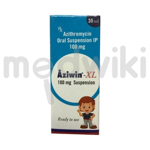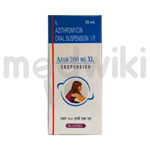miomycin
Introduction to Miomycin
Miomycin is a widely recognized antibiotic used to treat various bacterial infections. Known for its effectiveness, Miomycin is often prescribed to combat respiratory infections, skin infections, and certain sexually transmitted diseases. As an antibiotic, it works by inhibiting the growth of bacteria, thereby helping the body to fight off infections. Available in different forms such as syrup, capsules, and injections, Miomycin provides versatile options for administration based on the patient's needs and the severity of the infection. Its broad-spectrum activity makes it a popular choice among healthcare professionals.
Composition of Miomycin
The active ingredient in Miomycin is Azithromycin, which is present at a concentration of 100mg/5ml in its syrup form. Azithromycin is a macrolide antibiotic that interferes with bacterial protein synthesis, effectively stopping the growth of bacteria. This makes it highly effective against a wide range of bacteria, including those causing respiratory tract infections, skin infections, and other bacterial conditions. Azithromycin's ability to penetrate tissues and cells allows it to target bacteria that are difficult to reach, enhancing the overall efficacy of Miomycin.
Uses for Miomycin
- Treatment of respiratory infections such as bronchitis and pneumonia.
- Management of skin and soft tissue infections.
- Effective against certain sexually transmitted infections, including chlamydia.
- Used in the treatment of ear infections in children.
- Prescribed for sinus infections.
Side Effects of Miomycin
- Nausea and vomiting
- Diarrhea
- Stomach pain
- Headache
- Dizziness
- Allergic reactions such as rash or itching
Precautions of Miomycin
Before taking Miomycin, inform your healthcare provider about any allergies, pre-existing conditions, or other medications you are taking, as these may affect how you should use this antibiotic. It is crucial to complete the full course of Miomycin even if you feel better, as stopping too early may result in a return of the infection. Avoid taking antacids containing aluminum or magnesium within two hours before or after taking Miomycin, as these can reduce its effectiveness. Pregnant or breastfeeding women should consult their doctor before using this medication.
Conclusion
Miomycin, with Azithromycin as its active ingredient, is a powerful antibiotic with a broad spectrum of action against various bacterial infections. Available in syrup, capsules, and injection forms, it offers flexibility in administration and is effective in treating respiratory, skin, and sexually transmitted infections. While generally well-tolerated, it is essential to be aware of potential side effects and take necessary precautions to ensure safe use. Always follow your healthcare provider's instructions and complete the full course of treatment for the best results.
Similar Medicines
Available in 5 variations

Miomycin 250mg Tablet
Miomycin 250mg Tablet
strip of 6 tablets

Miomycin 100mg/5ml Syrup
Miomycin 100mg/5ml Syrup
bottle of 15 ml Syrup

Miomycin 100mg Tablet
Miomycin 100mg Tablet
strip of 6 tablets

Miomycin 200mg/5ml Syrup
Miomycin 200mg/5ml Syrup
bottle of 15 ml Syrup

Miomycin 500mg Tablet
Miomycin 500mg Tablet
strip of 3 tablets
Related Faqs

Why is Aktion given for 3 days?
The duration of treatment varies depending on the specific type of infection being treated and the age of the patient It is important to note that Aktion is not always prescribed for a 3day course Typically in most bacterial infections a single 500 mg dose is administered over a span of 3 days Another dosage option is to take 500 mg on day 1 and then reduce it to 250 mg from day 2 to day 5 However in certain instances like genital ulcer disease a single 1 gram dose is prescribed It is crucial to adhere to the treatment plan recommended by your doctor to ensure successful recovery

Why is Azid 200mg/5ml Syrup given for 3 days?
The duration of treatment depends on the type of infection being treated and the age of the patient. Azid 200mg/5ml Syrup is not necessarily given for 3 days. In most of the bacterial infections, a single dose of 500 mg is given for 3 days. Alternatively, it can be given as 500 mg once on day 1 and then 250 mg once from day 2 to day 5. In some cases of infection such as genital ulcer disease, it is given as a single 1 gram dose. Therefore, it is important that you stick to the regime advised by your doctor.

Can the use of Argex cause diarrhea?
There is a potential side effect associated with the use of Argex which can lead to the development of diarrhea Argex is primarily an antibiotic designed to eliminate harmful bacteria within the body However it can also impact the beneficial bacteria present in the stomach or intestine thus disrupting the natural balance and resulting in diarrhea If you notice persistent and severe episodes of diarrhea after taking Argex it is crucial to consult your healthcare provider for further guidance and evaluation This will allow your doctor to assess the situation thoroughly and determine the most appropriate course of action to alleviate the symptoms and address any underlying concerns effectively Keep in mind that your doctor is best positioned to evaluate your unique circumstance and provide personalized advice based on your specific needs So make sure to communicate any concerns or side effects you are experiencing to ensure optimal care and management of your condition

Is Azimount a strong antibiotic?
Azimount is a highly potent antibiotic that serves as a paramount solution for a wide range of bacterial infections Distinguished from other antibiotics Azimount boasts an extended halflife allowing it to linger within the body for an extended duration Consequently medical professionals typically prescribe Azimount once a day over a relatively short period In contrast alternative antibiotics possess a relatively shorter halflife necessitating multiple administrations throughout the day ranging from two to four times This distinctive characteristic of Azimount not only enhances patient convenience and compliance but also contributes to its efficacy in combating bacterial infections By remaining active for an extended period Azimount ensures a continuous presence of its therapeutic effects effectively eradicating the infection Furthermore the reduced frequency of administration minimizes the risk of missed or forgotten doses streamlining the treatment process With its prolonged halflife Azimount stands out as a reliable and efficient antibiotic rendering it an ideal choice for patients seeking a convenient and highly effective treatment option for bacterial infections

Can the use of Miomycin 200mg/5ml Syrup cause diarrhea?
Indeed the administration of Miomycin 200mg5ml Syrup can potentially trigger episodes of diarrhea This medication belongs to the antibiotic class which effectively eradicates harmful bacteria Regrettably it can also disrupt the equilibrium of beneficial bacteria within the gastrointestinal tract leading to the onset of diarrhea Should you encounter persistent or severe episodes of diarrhea it is crucial to consult your healthcare provider promptly to address this concern Diarrhea is a common side effect associated with the use of Miomycin 200mg5ml Syrup This medications primary function is to combat bacterial infections but it can inadvertently disrupt the delicate balance of bacteria in the digestive system resulting in diarrhea If you experience severe or persistent diarrhea after taking this syrup it is advisable to seek medical advice from your doctor They will be able to provide guidance on managing and alleviating this side effect It is essential to address any concerns regarding the medications potential impact on your digestive health to ensure your overall wellbeing

Can you get a yeast infection from taking Azinolix?
Thrush a prevalent fungal or yeast infection may afflict certain individuals following the consumption of Azinolix This antibiotic has the potential to eliminate the beneficial bacteria residing in the intestines leaving one susceptible to thrush If you experience symptoms such as vaginal itching discharge or discomfort it is crucial to promptly inform your healthcare provider Additionally it is important to notify your doctor if you observe white patches in your mouth or on your tongue either during the course of Azinolix treatment or shortly after discontinuation By promptly reporting these symptoms your doctor can assess the situation and provide appropriate guidance and treatment Remember vigilance and open communication with your healthcare provider are paramount to ensure your wellbeing during and after Azinolix administration
Related Posts

1:15
How Does Vitamin D3 Deficiency Affect Your Body? Shocking Symptoms Revealed!

1:15
Why Is Calcium Important for Kids? Common Deficiency Symptoms You Shouldn’t Ignore!

1:15
How to Increase Your Child’s Weight Naturally? Healthy Diet Tips for Parents!

1:15
Are Your Hormones Out Of Balance? Signs & Symptoms!

1:15
Amazing Benefits of Flaxseeds | Best Way to Eat Flax Seeds Daily!


















.svg)
